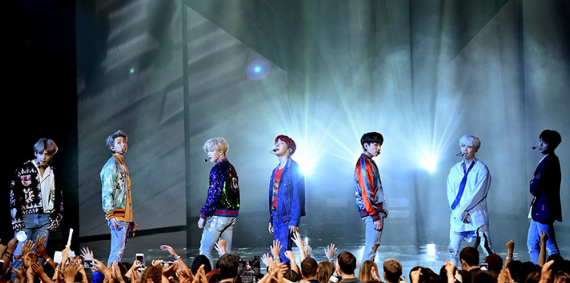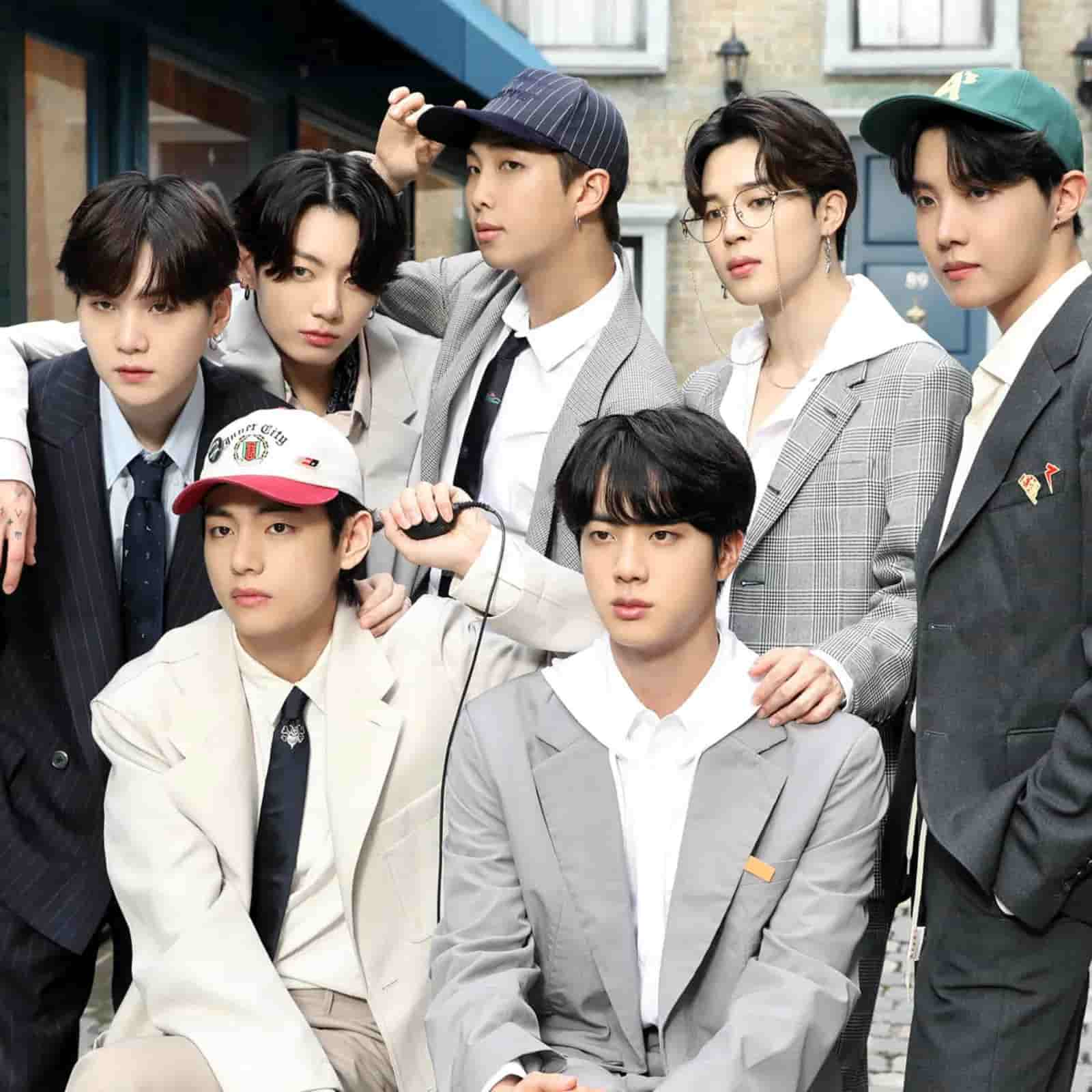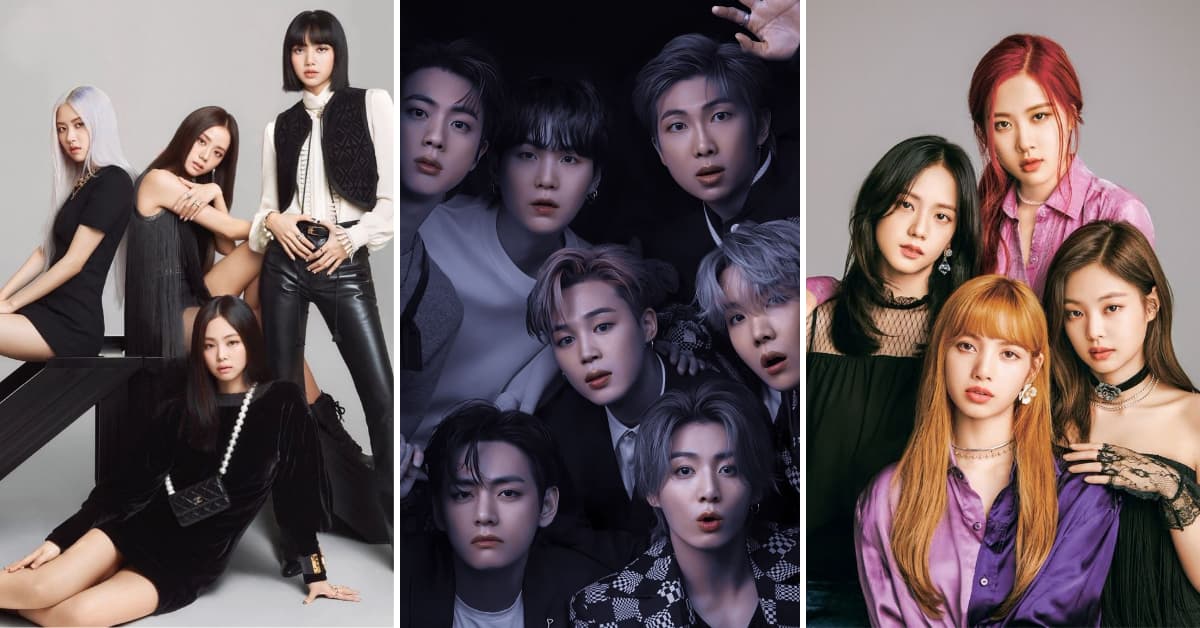BTS and BLACKPINK represent two distinct paths to K-Pop supremacy, with BTS dominating through authentic fan engagement and consistent content. At the same time, BLACKPINK conquers via strategic luxury positioning and selective exclusivity.
Both groups have fundamentally reshaped the global music landscape through contrasting approaches.
While BTS pioneered grassroots fan connection and frequent releases, BLACKPINK refined the formula through high fashion integration and strategic scarcity.
This comprehensive analysis examines their competition across streaming, social media, cultural impact, and business strategies to determine how both have collectively elevated Korean music globally.
Note: This article covers the topics and draws implications based on personal opinion and available web data.
BTS vs BLACKPINK Global Popularity And Fan Base In 2025
The battle for K-Pop supremacy intensifies as both groups continue to expand their global reach through various strategies.

BTS maintains dominance through consistent content creation and deep fan relationships, while BLACKPINK leverages premium positioning and selective appearances to maintain mystique.

A social media following comparison reveals interesting patterns across platforms, with BTS leading in engagement-focused platforms and BLACKPINK excelling in visual-centric spaces.
International recognition demonstrates that both groups have achieved mainstream media presence, albeit through different approaches to Western entertainment.
Concert attendance analysis demonstrates BTS’s touring frequency advantage, while BLACKPINK’s selective tour strategy creates higher demand per show. The scale of their live performances has contributed significantly to establishing the biggest fanbase in the world, with both groups commanding unprecedented global audiences.
Streaming numbers on major platforms reflect listening habits, with BTS appealing to consistent daily listeners and BLACKPINK attracting occasional but intense engagement.
ARMY vs. BLINKs showcase fascinating differences in fan organization, with ARMY’s grassroots activism contrasting with BLACKPINK’s fashion-forward fandom culture.
The following data showcase the current popularity metrics between the two groups:
BLACKPINK Vs BTS Popularity Metrics Comparison 2025
| Metric | BTS | BLACKPINK | Winner |
|---|---|---|---|
| Instagram Followers | 75.8 M+ | 58M+ | BTS |
| YouTube Subscribers | 80.4 M+ | 96.7M+ | BLACKPINK |
| Spotify Monthly Listeners | 25.6 M+ | 15.8 M+ | BTS |
| X (Twitter) Followers | 44.9 M+ | 10.8 M+ | BTS |
| Concert Attendance (2024) | 2.3M+ | 1.8M+ | BTS |
These numbers demonstrate the intense competition between the two groups across different platforms, with each excelling in specific areas that align with their distinct brand strategies and fan engagement approaches.
Platform dominance reveals how each group’s strategy translates into measurable engagement across the digital landscape.
BLACKPINK Vs BTS: Musical Style And Discography
Musical evolution tells the story of two vastly different artistic journeys that have shaped modern K-pop’s global appeal.
1. Musical Journey
BTS’ musical journey began with hip-hop roots, evolving into a genre diversity that spans pop, rock, R&B, and EDM while maintaining their core message of self-acceptance. Their influence extends beyond traditional K-Pop boundaries, contributing to the broader K-Pop vs J-Pop cultural conversation in Asian music markets.
BLACKPINK’s signature sound centers on their girl crush concept with heavy EDM influence, creating anthemic tracks designed for maximum impact.
2. Comparison of Lyrical Themes
BTS focuses on social commentary, mental health, and personal growth, while BLACKPINK emphasizes female empowerment and confidence.
3. Production Styles
BTS is heavily involved in self-producing and songwriting, in contrast to BLACKPINK’s collaborations with international hitmakers.
4. Album Structures
BTS releases full albums regularly while BLACKPINK follows strategic single releases, building anticipation.
5. Vocal and Rap Line Analysis
BTS’s balanced approach across seven members versus BLACKPINK’s focused individual strengths within four members.
This creative divergence has allowed both groups to occupy different spaces in the global music landscape effectively.
BTS vs BLACKPINK: Who Reigns Supreme In Awards & Records?
Achievement analysis reveals how different strategies translate into industry recognition and commercial success across various metrics.
1. Billboard chart performance: BTS is dominating with multiple Hot 100 number-ones, while BLACKPINK achieves consistent top-tier placements. Their success has sparked discussions about who has the most Grammys among contemporary artists, though K-pop acts are still building their Grammy legacy.
2. Awards tally: BTS’s Grammy nominations and multiple American Music Awards versus BLACKPINK’s MTV VMA wins and fashion industry recognition.
3. YouTube records: Highlight both groups’ video dominance, with different viral strategies.


4. Album sales figures: Worldwide, this reflects BTS’s frequent releases versus BLACKPINK’s high-impact, limited drops.
5. Guinness World Records: Showcases both groups breaking barriers in different categories.
6. Industry firsts: Pioneering moments that opened doors for future K-Pop acts.
How many Daesangs does BLACKPINK have? Well, BLACKPINK has not won a Daesang at the main Korean music award shows, focusing instead on international recognition and brand achievements.
Career achievements reveal the competitive landscape between these K-pop giants, with each excelling in different recognition categories.
Major Achievements Comparison Between BTS & BLACKPINK
Recognition patterns demonstrate how each group’s focus areas translate into measurable industry success.
| Achievement Category | BTS | BLACKPINK |
|---|---|---|
| Grammy Nominations | 3 | 0 |
| Billboard Hot 100 #1s | 6 | 0 |
| YouTube Billion-View MVs | 6 | 4 |
| World Tour Gross | $800M+ | $400M+ |
| Album Sales (Millions) | 350+ | 90+ |
| Coachella Headliner | No | Yes |
Both groups have achieved remarkable milestones in different areas of the entertainment industry, with BTS dominating traditional music metrics while BLACKPINK excels in cultural breakthrough moments and brand influence.
BTS Vs BLACKPINK: Performance Style & Choreography
Stage presence analysis reveals fundamentally different approaches to live entertainment that have shaped each group’s concert reputation.
1. Choreography complexity reveals that BTS emphasizes synchronized group formations, whereas BLACKPINK showcases individual moments within their group routines.
Both groups have mastered the art of creating the fastest sold-out concerts, demonstrating their incredible drawing power in the live music industry.
2. Stage production values differ with BTS creating immersive storytelling experiences while BLACKPINK focuses on high-fashion visual spectacles.
3. Live vocal performance capabilities demonstrate the strengths of both groups in various performance contexts.
4. Fashion and styling approaches during performances reflect their distinct brand positions in the industry.
5. Audience interaction techniques show BTS’s intimate fan connection versus BLACKPINK’s commanding stage presence.
6. Music video cinematography reveals artistic vision differences that extend their performance concepts.
Performance philosophy differences have created distinct live entertainment experiences that cater to different audience preferences.
Stage mastery demonstrates how each group’s performance philosophy creates memorable experiences that reinforce their brand identity.
Business Strategy & Marketing: HYBE Vs YG Entertainment
Corporate approach analysis reveals how different management philosophies have shaped each group’s market positioning and fan relationship dynamics.


1. Company management styles contrast HYBE’s fan-centric approach with YG’s luxury branding focus, resulting in distinct relationships between artists and their audiences.
2. Release strategies exhibit frequent content drops compared to strategic scarcity models, which impact fan engagement patterns.
With BTS members currently navigating military service, fans eagerly anticipate news about the BTS reunion 2025 and how it will affect the group’s future release strategy.
3. Brand partnerships demonstrate diverse collaborations, shifting the focus from luxury fashion to targeting different consumer segments.
4. Social media engagement tactics reveal the distinction between community-building and aspirational content strategies.
5. Merchandise and album packaging innovations show accessibility versus premium positioning approaches.
6. Global expansion methodologies highlight grassroots fan cultivation versus high-profile partnership strategies.
The contrasting business approaches have significantly shaped each group’s market positioning and long-term sustainability strategies.
BTS Vs BLACKPINK Business Strategy Comparison
| Strategy Element | BTS (HYBE) | BLACKPINK (YG) |
|---|---|---|
| Content Frequency | High | Strategic/Limited |
| Fan Platform | Weverse | Standard Social Media |
| Brand Partnerships | Diverse | Luxury Fashion Focus |
| Solo Activities | Limited During Group Peak | Encouraged |
| Album Pricing | Fan-Friendly | Premium |
| Tour Frequency | Regular | Selective |
These different approaches have created distinct fan experiences and market penetration strategies, with HYBE prioritizing accessibility and YG emphasizing exclusivity for sustainable brand value.
Who Is More Successful, BLACKPINK Vs BTS?
Success measurement depends entirely on defining criteria, as both groups excel in different aspects of the entertainment industry, making direct comparison complex and subjective.
Their combined influence has contributed to establishing K-Pop groups among the biggest boy band in the world rankings, though BLACKPINK represents the girl group category.
BTS Vs. BLACKPINK Cultural Impact And Influence
Cultural analysis reveals how both groups have transcended music to influence broader societal conversations and global trends.
1. The diplomatic and social impact of BTS’s UN speeches and UNICEF partnerships versus BLACKPINK’s fashion industry influence and cultural ambassadorship roles.
With individual members also making waves, such as J-Hope’s tour 2025 plans, both groups continue expanding their cultural reach through solo endeavors.
2. Breaking barriers in Western entertainment demonstrates different breakthrough strategies and sustained presence approaches.
3. The fashion industry’s influence reveals BLACKPINK’s luxury brand partnerships versus BTS’s accessible style trendsetting.
4. Social media trendsetting shows authentic connection building versus aspirational lifestyle content creation.
5. Inspiring the next generation of K-Pop artists through different mentorship approaches and industry pathways.
6. Cross-cultural collaborations highlight various partnership strategies with Western artists and brands.
Cultural footprint analysis reveals the significant contributions of both groups to global Korean cultural influence through distinct methodologies.


Global influence patterns reveal how each group’s approach to cultural diplomacy has opened different pathways for Korean entertainment worldwide.
BTS Y BLACKPINK Juntos: Will They Collab?
A BTS and BLACKPINK collaboration remains highly unlikely due to company competition, scheduling conflicts, and strategic positioning differences, although fans continue to hope for future possibilities.
BTS And BLACKPINK Couple
The BTS and BLACKPINK couple has not been officially confirmed by either management company or the artists themselves.
The V and Jennie pairing generated significant media attention but lacked official confirmation.
Other rumored pairings are based primarily on fan speculation and media rumors, not verified facts. Jennie and Suga have no known collaborations, public interactions, or professional ties as of June 2025.
Both agencies maintain a policy of privacy regarding artists’ personal relationships. Meanwhile, ongoing speculation about BLACKPINK disbanding continues to circulate, though the group maintains their individual and collective activities.
Also Checkout:
Conclusion: BTS Built It, BLACKPINK Globalized The Game
The BTS vs. BLACKPINK debate reveals two complementary forces that have collectively transformed K-Pop into a global phenomenon: BTS built the foundation through grassroots authenticity, while BLACKPINK globalized the blueprint through luxury cultural integration.
BTS achieved mainstream dominance with 350+ million album sales and multiple Billboard number-ones, while BLACKPINK pioneered K-Pop’s integration with high fashion and festival culture. R
Rather than declaring a winner, both groups have opened doors for Korean music internationally, proving that authentic artistry and strategic branding can coexist to elevate the entire industry.
FAQs
A collaboration remains unlikely due to company competition, different creative directions, and strategic positioning conflicts, though industry changes could make future partnerships possible.
BTS members trained for varying periods (1-6 years), focusing on performance skills, while BLACKPINK members underwent longer, more intensive training emphasizing individual excellence and brand development.
BLACKPINK dominates fashion influence through luxury brand partnerships and red-carpet appearances, while BTS influences accessible street fashion and youth culture styling trends.
Public interactions remain minimal due to company protocols and scheduling, though industry events occasionally bring members together for brief professional encounters and courteous exchanges.
BTS’s military hiatus has allowed BLACKPINK to capture more spotlight temporarily, though ARMY loyalty remains strong while anticipating the group’s complete return in 2025-2026.
Limited lip-syncing accusations arose during specific festival performances, though industry standards often require backing tracks for complex choreography, making this a common practice rather than a controversy.

